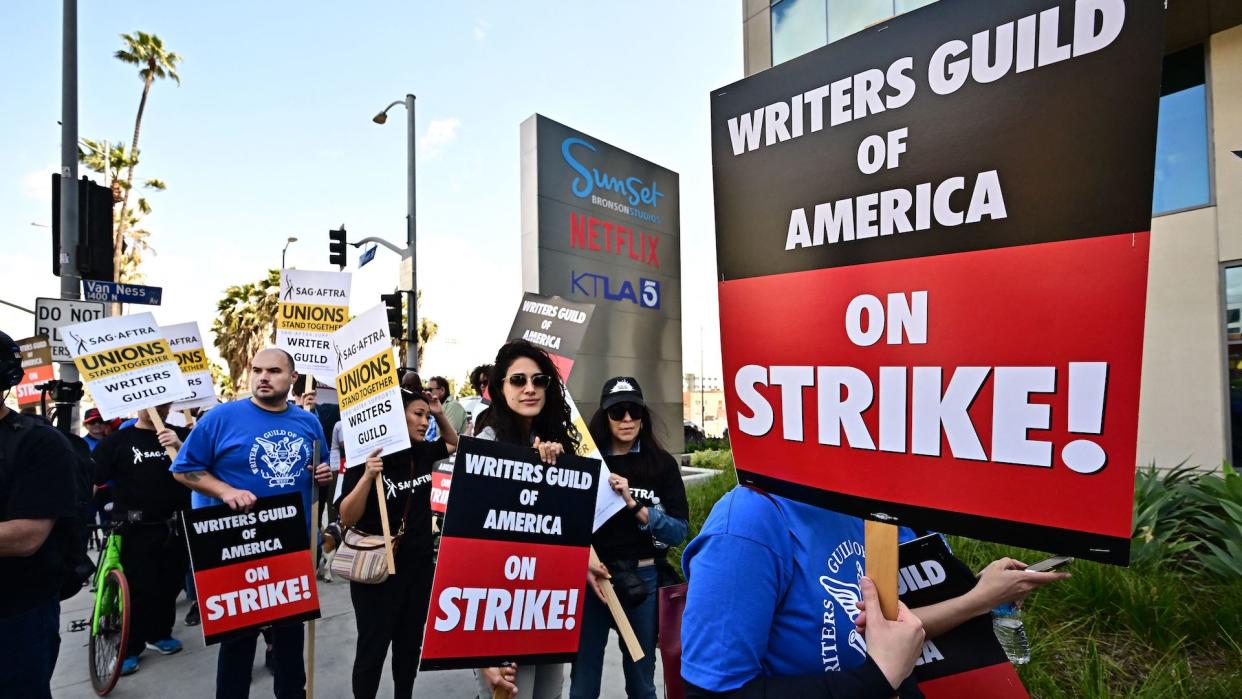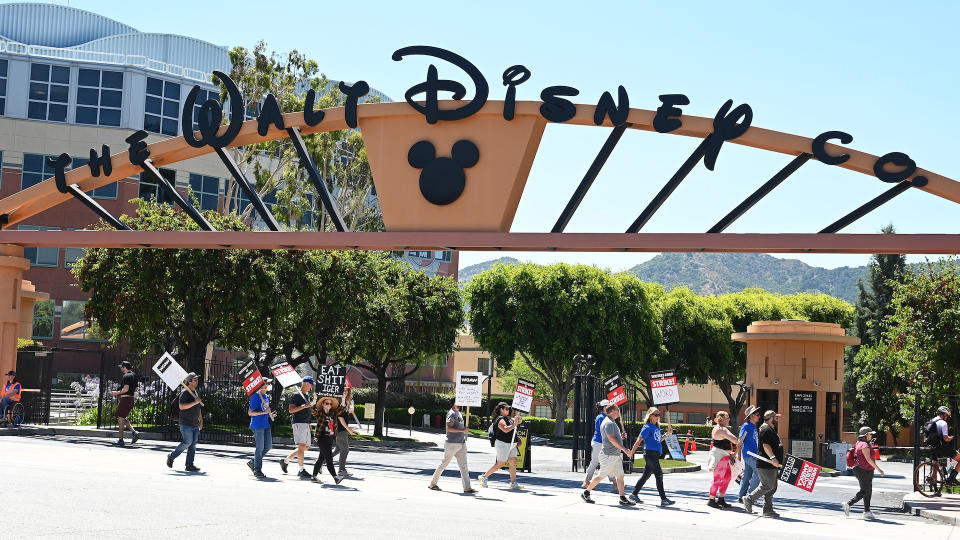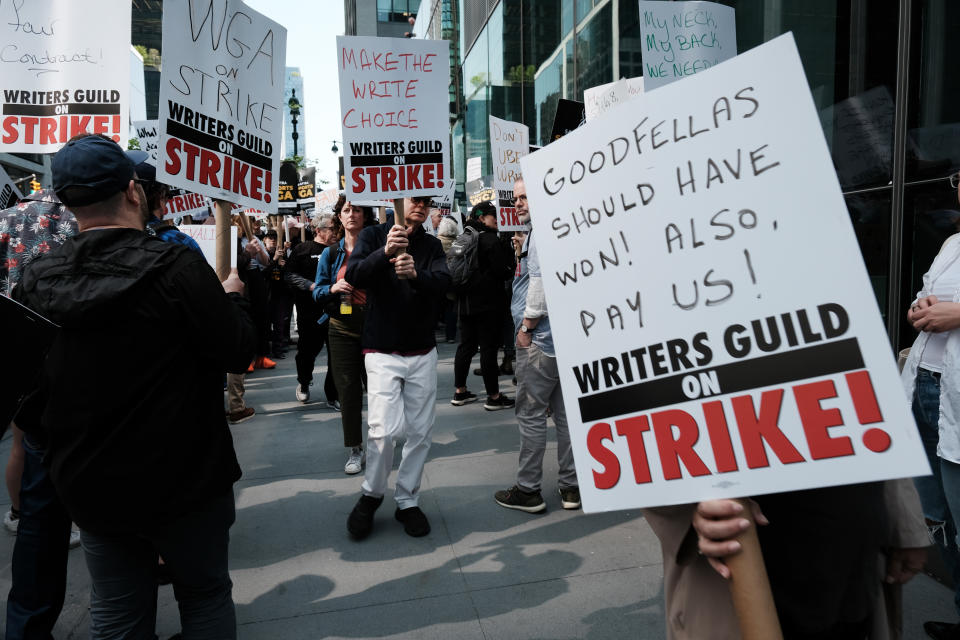Writers Guild Wants the Government to Keep Disney, Amazon, and Netflix from Getting Any Bigger

Just as the Writers Guild and the AMPTP are currently at the negotiating table trying to hash out a deal that could end a strike that’s lasted for over 100 days, the Writers Guild of America West has released a blistering new report that calls on lawmakers and antitrust agencies to regulate what it says are anti-competitive practices by Disney, Amazon, and Netflix, specifically.
Pundits and analysts have speculated for some time that, in the near future, only a handful of the many streaming services available today will survive, and consolidation could mean there are just a few media giants left standing. The WGAW’s new report from Thursday, titled “The New Gatekeepers,” believes Disney, Amazon, and Netflix will be those players. And it wants policymakers to act now in keeping them from getting any bigger.
More from IndieWire
Specifically, it says that to “protect the future of media,” lawmakers must “block further consolidation,” “proactively investigate anti-competitive practices and outcomes,” and “increase regulation and oversight in streaming.”
“Writers being forced to strike in this climate should come as a surprise to no one,” WGAW’s Research & Public Policy Director Laura Blum-Smith said in a statement. “We’re transitioning from a period of rapid investment and competition that brought about new and diverse content to a monopolistic model that will concentrate control over entertainment programming in the hands of just a few large and powerful corporations. For writers, that means fewer buyers for their work, employers who exert more leverage in individual deal negotiations, and depressed pay and working conditions.”
The report kicks off alleging the monopoly that CBS, NBC, and ABC had over TV viewers up through 1970 and how federal antitrust groups had to break up that dominance over the airwaves. But it now says Disney, Amazon, and Netflix are positioning themselves as the next gatekeepers that will soon control all media, and that Wall Street is cheering them on to further merge and squeeze out competition.
“Each is now taking anti-competitive vertical integration to an extreme, turning its streaming service into a walled garden for self-produced content — a model built for and dependent on restricting the availability of independent content from competing producers, underpaying creators, and, above all, making future consolidation the name of the industry game,” the report reads. “Each has demonstrated that it will abuse a position of dominance to disadvantage competing producers and streaming services, reduce output, creativity, and choice in content, and push down wages for creative workers. Unless antitrust agencies and lawmakers prevent future merger activity by dominant firms and step in to preserve and protect the competitive environment for other streaming services, the future of content is in peril.”

For its analysis of Disney, WGAW looks back at the studio’s $19 billion acquisition of ABC in 1995 as the starting point for its “anti-competitive behavior,” accusing the company of reducing output after gobbling up other studios (such as shuttering the animation house Blue Sky Studios after the Fox acquisition), and further leading the charge of companies pulling back their copyrighted content in order to bolster their own streamers. The report argues that writers and independent producers don’t have a choice to walk away from poor terms as a result of Disney’s vertical integration, especially if they want to work on any of Disney’s tentpole IP properties. It also cites recent price hikes for Disney+ and an analyst report that projects Disney will have 42 percent of all streaming subscribers by 2025.
For those reasons, the WGAW suspects Disney could seek to acquire another competing studio or other major IP. Though for what it’s worth, Disney CEO Bob Iger recently said that ABC and some of its other linear TV businesses are “non-core,” leading to speculation that networks like that or even ESPN could be spun off or sold and that Disney would get smaller, not bigger. Iger was even asked on the most recent earnings call whether Disney itself could be wholly acquired by a tech giant like Apple.
In the case of Amazon, the WGAW didn’t give Jeff Bezos’ company a pass just because it’s new to the media game. It says the company’s “exploitative practices” over pricing, acquisitions, and “abusing” its position between competitors and customers are part of the company’s playbook, including for media.
The guild certainly didn’t like Amazon’s $8.5 billion acquisition of MGM and says Amazon has never produced a show or movie for a service other than itself. But the control it has over its Fire TV interfaces and its ability to extract fees makes it a literal gatekeeper over which services can show their content. The guild cites a media report circa when HBO Max first launched about how new subscribers to the streamer slowed because, for months, it wasn’t available on Amazon devices.

Finally, Netflix, it says has gone from upstart innovator to “powerful incumbent focused on raising prices, vertically integrating, and exerting its dominance over workers.” It says that though it once had a habit of rescuing canceled shows from other networks, that habit has slowed, and seemingly popular shows canceled on Netflix almost never have the same luxury to go elsewhere. It cites the WGAW’s own challenge against Netflix that demanded the streamer pay out $42 million in underpaid residuals, as well as refer to the ongoing fight over data transparency. And it doesn’t approve of Wall Street’s urging to further raise prices and cut costs.
“No longer committed to competitive innovation, the company will slash programming and underpay workers, abusing its dominant position to offer consumers less content—and less innovative content—for more money,” the report says.
The report concludes by saying that there is no regulatory oversight for streaming the way there is for broadcast TV networks, meaning that while Disney couldn’t buy the Fox network in its acquisition, there’s nothing stopping the company from buying out Comcast’s share of Hulu and merging it with Disney+, as Disney seems poised to do. And it also says that Sony, Paramount, and Warner Bros. Discovery are likely not going to remain major competitors for long.
“Paramount is disadvantaged by a comparative lack of scale, Sony by a lack of vertical integration, and Warner Bros. Discovery appears to be already withdrawing from its investment in HBO Max,” the report claims.
Among the guild’s recommendations are that antitrust groups block further acquisitions by Disney, Amazon, and Netflix, including any mergers, that it should investigate competitive practices by the companies, and sweeping new rules need to be put in place around streaming to “level the playing field.”
Read the full report here.
Best of IndieWire
Unsimulated Sex Scenes in Film: 'Nymphomaniac,' 'Brown Bunny,' 'Little Ashes,' and More
The Best LGBTQ Movies and TV Shows Streaming on Netflix Right Now
Sign up for Indiewire's Newsletter. For the latest news, follow us on Facebook, Twitter, and Instagram.

 Yahoo News
Yahoo News 
